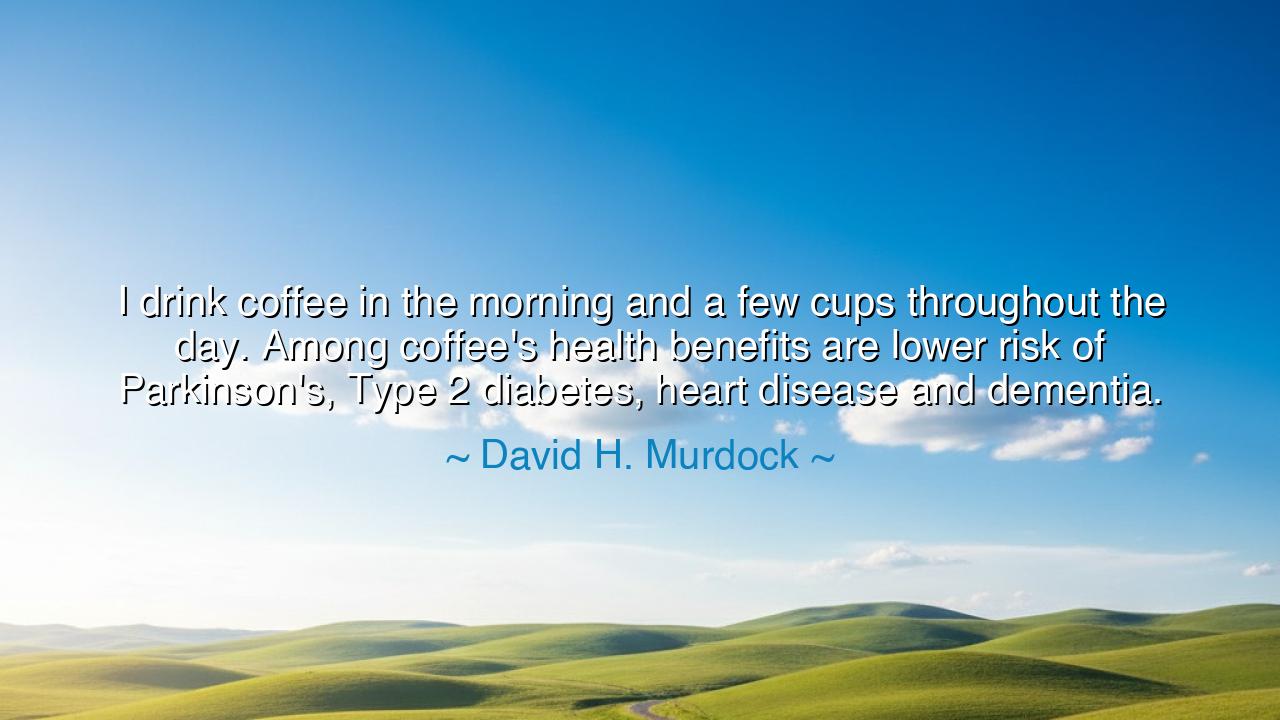
I drink coffee in the morning and a few cups throughout the day.
I drink coffee in the morning and a few cups throughout the day. Among coffee's health benefits are lower risk of Parkinson's, Type 2 diabetes, heart disease and dementia.






In the simple yet profound words of David H. Murdock, we hear a meditation on both discipline and delight: “I drink coffee in the morning and a few cups throughout the day. Among coffee’s health benefits are lower risk of Parkinson’s, Type 2 diabetes, heart disease and dementia.” At first glance, this may seem a practical statement — a nod to health and habit — but beneath it lies a timeless truth: that wisdom often dwells in the balance between pleasure and purpose, between what nourishes the body and what awakens the spirit. For in the humble cup of coffee, there is not only warmth and energy, but the story of human endurance, exploration, and renewal.
From the ancient highlands of Ethiopia, where legend tells of a shepherd named Kaldi who first noticed his goats dancing after eating the red berries of the coffee plant, to the bustling cities of our modern age, coffee has been a companion to thought, to work, and to wonder. It is more than a drink — it is a ritual of awakening, a communion between man and nature. The aroma of coffee rising at dawn is the same scent that stirred the monks of old before prayer, the sailors before voyage, the scholars before study. Thus, when Murdock speaks of his morning cup, he partakes in an ancient lineage — a ritual of renewal practiced by countless generations who sought not only vigor, but clarity.
In praising the health benefits of coffee — its power to reduce the risk of Parkinson’s, Type 2 diabetes, heart disease, and dementia — Murdock reminds us that even small, daily choices can shape the destiny of our bodies. It is not the grand acts alone that build longevity, but the quiet, consistent rituals. The ancients understood this: the Greeks taught metron ariston — “moderation is best.” The wise do not scorn the small pleasures of life, nor do they let them rule over them. They find harmony in their habits, turning them into a rhythm of vitality. Murdock’s coffee is such a symbol — an emblem of simple balance, where enjoyment and well-being meet in peace.
Consider also the story of the Sufi mystics of Yemen, who centuries ago brewed coffee to aid them in their long night vigils. Through its stimulating strength, they could pray and meditate deep into the dark hours, seeking divine union. The drink that kept their bodies awake became also a symbol of spiritual alertness — the reminder to keep the mind sharp and the soul attentive. So too, in our modern lives, coffee becomes not merely a stimulant of the flesh, but a metaphor for awareness. Each sip is a call to awaken — to rise to one’s purpose, to meet the day’s trials with clarity and heart.
Murdock’s words also reflect the wisdom of one who has lived long and observed deeply. He does not glorify indulgence, but intentional living. To him, health is not a matter of medicine alone, but of mindful habits — of choosing that which sustains both body and spirit. When he speaks of coffee’s benefits, he speaks as one who honors the intricate connection between nature’s gifts and human longevity. It is a lesson for our time: that even the smallest ritual, when practiced with consciousness, can become a pillar of strength and well-being.
Yet there is another layer to his reflection — the understanding that the body is the servant of the mind, and the mind the servant of purpose. The morning cup is not only for pleasure or prevention of disease, but for preparation — a way to align one’s energy with the tasks of the day. The ancients would say that a man’s vitality is sacred, for it fuels the deeds that shape the world. Thus, to care for one’s health — even through something as humble as coffee — is to honor the divine duty of living fully.
And so, the lesson in Murdock’s words is clear and enduring: cherish the rituals that awaken you. Do not despise the small sources of strength, for in them lie the seeds of longevity. Seek harmony between what delights you and what sustains you. Drink your morning coffee not in haste, but with reverence — as an act of gratitude to the earth, to your body, to your day. Let it remind you that health is not a battle, but a friendship — a partnership between the human will and the gifts of nature.
Therefore, take this teaching as the ancients would: live with awareness, consume with purpose, and awaken with joy. Let each sunrise find you mindful of your breath, your habits, and your blessings. For the wise do not chase immortality through extremes; they build it quietly, cup by cup, choice by choice. As Murdock’s words teach us, even a morning ritual — when done with care — can become a prayer to life itself.






AAdministratorAdministrator
Welcome, honored guests. Please leave a comment, we will respond soon